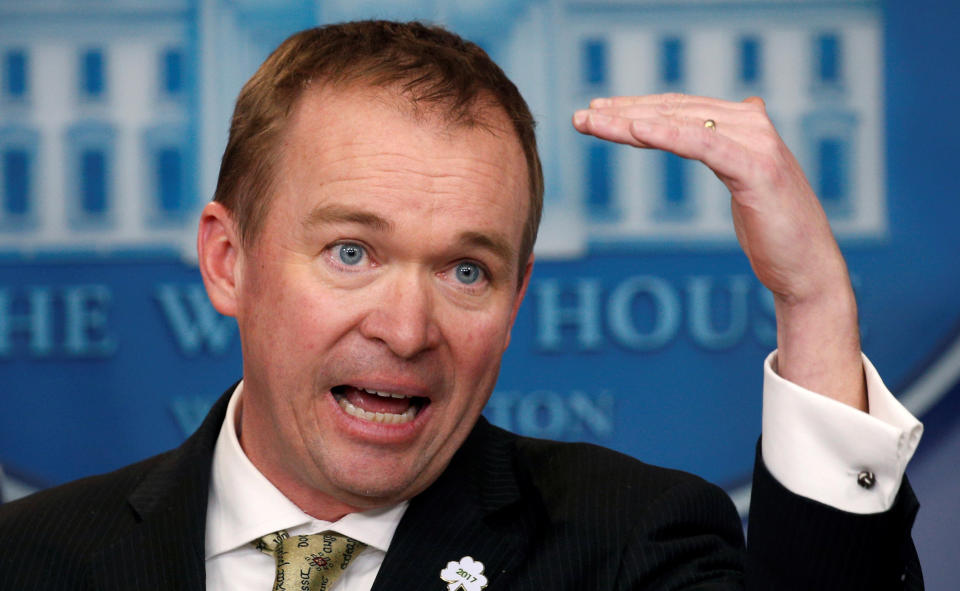White House unfreezes hiring, outlines plan to ‘drain the swamp’
In a briefing on Tuesday, Office of Management and Budget Director Mick Mulvaney gave reporters a broad roadmap to accomplishing a long-standing goal of small-government conservatives to trim the federal government’s payroll. Ronald Reagan and other presidents may have tried to accomplish this goal, Mulvaney said, but President Donald Trump’s day-one hiring freeze showed it to be a particular priority.
The freeze, however, will be lifted.

Significant detail about future restructuring was absent from the briefing, apart from a general timeline for a larger version of the extended “listening sessions” Trump and other administration officials have been conducting, often with CEOs and other business leaders. Mulvaney said the administration fielded ideas earlier on Tuesday from a group of CEOs, and would take broad suggestions from the federal workforce, agencies, and general public from June to September.
“Then in September we’ll be going back to the president and start putting things into place roughly 11 months from today,” he said.
Mulvaney says the people affected by downsizing need to understand that fixing the government is more important than a smaller group’s interest, and that changes would engender meritocracy and curb frustration.
“If you’re a really good federal worker, you should welcome this because you’ll get a chance to be rewarded,” he said.
Management consulting for the government
Without committing to specific examples before this comments period, Mulvaney pointed to the seemingly antiquated ways the government is run, like how the Department of Energy instead of the Department of Defense regulates nuclear weapons. He also noted that 43 workforce retraining programs spanned 13 different agencies, making accountability difficult without consolidation.
The White House is limited in the scope of what it can change, as some changes require the approval of Congress, which Mulvaney noted may have different priorities. However, the administration views the two branches as sharing the same goals.
“They have interest in finding the savings too,” Mulvaney said, referring to Congress.
The common goals of efficiency and waste-reduction should transcend party lines, Mulvaney said, remarking on his agreements and discussions with Vermont democrat Rep. Peter Welch on “good” and “bad” government. “Peter Welch would agree that leaving the lights at a federal building overnight is bad government,” he said.
But Mulvaney’s example of Vermont-friendly conservatism—which is more conservation than conservatism—may come up against a strong road block along party lines when it comes to cutting the federal workforce significantly.
Mulvaney addressed controversy after his last meeting, where he proposed cuts to Meals on Wheels and after-school services. “I didn’t say we were cutting Meals on Wheels. We are looking at the effectiveness of programs,” he said when asked by a reporter to clarify his earlier statements. “We have a responsibility to give people the best services they can. We also have a responsibility for people who are paying, the taxpayers.”
This is not Bannon’s “deconstruction of the administrative state”
Mulvaney said the Trump administration wants to rebuild the executive branch, but did not see any parallels in his strategy to White House Chief Strategist Steve Bannon’s “deconstruction of the administrative state.” Instead, Mulvaney likened it to a different slogan from the Trump camp: “draining the swamp.”
“This is really important to the president,” said Mulvaney. “What you’re talking about is restructuring Washington, D.C., which is draining the swamp. That’s what this is—this is a centerpiece.”
Mulvaney further distanced himself from the Bannon camp. “We are not going into this with any ideological preconception. It’s a blank sheet of paper. We’re not just asking conservative think tanks. We’re asking the public.”
Ethan Wolff-Mann is a writer at Yahoo Finance focusing on consumer issues, tech, and personal finance. Follow him on Twitter @ewolffmann. Got a tip? Send it to tips@yahoo-inc.com.
Read more:
Subprime auto loans too small to be a big problem, says Dimon
An interesting market sign says private jet sales may be about to take off
Democrats found a way to speak Trump’s language
What Trump’s intriguing Nafta changes say about his other promises
Facebook’s copy of Snap stories is a reminder of a Silicon Valley hard truth
The trick to getting credit card fees waived? Just ask
These two companies lobby to make your taxes way harder
Chase’s Sapphire Reserve is very worth it, even with its slashed bonus
